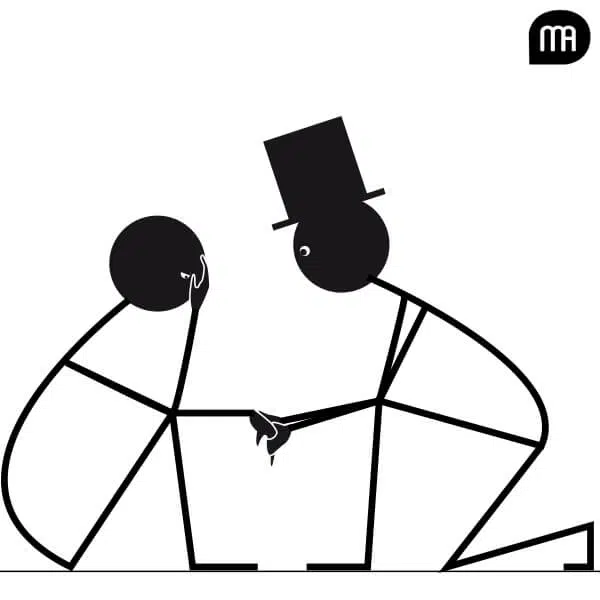
The remorse of Judas Iscariot
The fate of the criminal imagined by Adam Smith is rather favourable: if his remorse is sincere, he will be able to obtain “protection.” But the conclusion could have been more pessimistic. The New Testament offers an example: Judas Iscariot. It is known that Judas’ betrayal will lead to the death sentence of Jesus of Nazareth. He handed Jesus over to the religious authorities for a sum of money. But the Gospel according to St. Matthew tells us that the day after Jesus’ arrest, he presented himself to the chief priests to restitute the money. Here is the passage in question:
“When Judas, who had betrayed him, saw that Jesus was condemned, he was seized with remorse and returned the thirty pieces of silver to the chief priests and the elders. ‘I have sinned,’ he said, ‘for I have betrayed innocent blood.’ ‘What is that to us?’ they replied. ‘That’s your responsibility.’” (3)
In general, the word “remorse” is used to describe the psychological state that led Judas to return the money to the priests (4). Sometimes the verb “to repent” is used (5). But the two words, although considered synonymous, do not cover the same psychological reality. This is an important question, since we seek, through the example of Judas, to establish a conceptual link with the concept of consolation. This question deserves a brief examination.
Remorse and Repentance
The Greek verb used in the above passage is metamelomai [literally to change one’s care], which means “to have regrets about something, in the sense that one wishes it could be undone, be very sorry, regret; to change one’s mind about something, without focus on regret, change one’s mind, have second thoughts” (6) – but it is also translated as “to repent.” Rather, it is the verb metanoeó, which refers to the action of repentance – “to change one’s mind [literally meaning of meta-noeó]; to feel remorse, repent, be converted” (7). Matthew uses it, for example, at the beginning of his gospel. It is pronounced by John the Baptist, who preaches in the desert: “Repent, for the kingdom of heaven has come near” (Matthew 3:2). The distinction between remorse and repentance – between the verbs metamelomai and metanoeó – has often been commented on. Joseph Henry Thayer, for example, appreciated the relationship between the two terms:
“The distinctions so often laid down between these words [metamélomai and metanoeó], to the effect that the former expresses a merely emotional change the latter a change of choice, the former has reference to particulars, the latter to the entire life, the former signifies nothing but regret even though amounting to remorse, the latter that reversal of moral purpose known as repentance – seem hardly to be sustained by usage. But […] metanoeó is the fuller and nobler term, expressive of moral action and issues […].” (9)
But the two words do not only have a different value. In their lexicon of the Greek language of the New Testament, Johannes Louw and Eugene Nida do not classify them in the same category. One (metamelomai) belongs to attitudes and emotions, the other (metanoeó) to Behavior and related states (10). Specifically, metamelomai (“to feel regret as the result of what one has done”) belongs to the sub-category Sorrow, Regret, while metanoeó (“to change one’s way of life as the result of a complete change of thought and attitude with regard to sin and righteousness”) belongs to the sub-category Change behavior – as, indeed, do the terms we are now discussing.
Conversion
Two related words are in fact used in the Gospels, but also among the thinkers of antiquity: epistrophé, which refers to the idea of conversion: “turning one’s attention to something; change of one’s way of thinking or believing, conversion;” and epistrephó, which means “to return to a point where one has been; to change direction; to cause a person to change a belief or course of conduct, with focus on the thing to which one turns; to change one’s mind or course of action, for better or worse” (11). Paul Aubin noted in their regard that these two words “reappear with notable frequency,” that they “are part of everyday language where their general meaning evokes the notions of ‘turning towards’, ‘paying attention to’, ‘turning back’, ‘converting’” (12). The idea of return (turnaround, turning back) is important here. It includes the concept of repentance. The definition proposed by Louw and Nida – “to change one’s manner of life in a particular direction, with the implication of turning back to God; ‘to change one’s ways, to turn to God, repentance’” (13) – manifests the intrinsic link between return and repentance. Conversion is closely related to the concept of repentance. For a person, its meaning goes beyond “adopting a new religion by abandoning one’s previous religion, one’s previous beliefs” (14). It expresses the inner movement that leads to an authentic transformation of the soul (15). This is one of the meanings of the Latin word conversio: “change, mutation, metamorphosis” (16). In its religious and philosophical sense, it implies, according to the description of Pierre Hadot, “a change of mental order, which can go from the simple modification of an opinion to the total transformation of the personality” (17). But there are several ways of conceiving a change. It can receive different degrees, be more or less persistent, suppose an opposition with a previous state followed by a turnaround, depend on an attractor, an entity that catches the eye. Without going into detail about these nuances, Hadot emphasises that the semantic content of the concept of conversion comprises two components, which we already know from what has been said above:
“The Latin word conversio corresponds in fact to two Greek words of different meanings, on the one hand epistrophé, which means change of orientation and implies the idea of a return (return to the origin, return to oneself), and on the other hand metanoia, which means change of thought, repentance, and implies the idea of mutation and rebirth.”
These two components, epistrophé and metanoia, create a tension within the idea of conversion:
“There is therefore, in the notion of conversion, an internal opposition between the idea of ‘return to the origin’ and the idea of ‘rebirth’. This fidelity-rupture polarity has strongly marked Western consciousness since the appearance of Christianity. [...] Christian conversion, too, is epistrophé and metanoia, return and rebirth.”
Judas and the value of consolation
We can now return to the case of Judas –with no pretension of giving any meaning to his visit to the priests, during which he affirmed his fault and restituted the silver coins, nor to his psychological situation. It goes without saying that these facts can only give rise to interpretation. Thus, Jean-Christian Petitfils explained that “it is very difficult to say whether the traitor was caught up in genuine remorse [...], if he was late in measuring the consequences of his act” (18). If this was the case (a psychologically plausible hypothesis and in accordance with the conduct of other protagonists of the Gospels), then Judas “would not have understood that the authorities in Jerusalem desired the death of Jesus.” And, Petitfils continues, “by restituting the silver coins, he seems to have wanted to free himself from his responsibilities, perhaps to cancel the curse that had befallen him.” Let us pause at this rather rapid interpretation. It suggests that Judas measured a posteriori the scope of his act, although it had a temporal dimension, since the perpetrator had persevered in his betrayal (supposing that he had committed intentional acts, that he knew what he was doing). Before the priests, even though he knows Jesus is condemned, Judas seems to wish that what he provoked had not happened (let’s remind ourselves of the definition of metamelomai: “to have regrets about something, in the sense that one wishes it could be undone”). He feels regret in the sense that he is displeased with himself for having done wrong (19). This regret can be associated with the desire to flee from responsibility, not to accept one’s fault, to refuse or not to lend oneself to abandonment which, at least from a Christian perspective, testifies to true repentance. The foregoing developments suggest that it is unlikely that the restitution of the money for his betrayal was motivated by repentance or conversion. Had he shown not only remorse but genuine repentance, or had he achieved “true conversion,” as Blaise Pascal put it (20), he might have been thought to have received divine consolation. According to the interpretation of Origen (185-253), it is wrong to believe on principle that this divine consolation would have been denied him. In an article devoted to this interpretation, Samuel Laeuchli noted that if Judas’ repentance “was not the right one,” if “he did not repent, according to his own conscience, as he should have repented,” the possibility of repentance (and consolation) remained open:
“Origen does not believe that the fact of betraying Christ excluded all possibility for forgiveness and full cleansing. Judas could have done what the malefactor on the cross did: asked Jesus for forgiveness by saying, ‘Remember me, when thou comest into the kingdom’ and he would have received atonement for the betrayal.” (21)
The only hope Judas seemed to have was to receive human consolation. But it was denied to him, and this denial redoubled his suffering. The response of the priests sent him back to his inner world, invaded by astonishment and remorse. The two parts of the answer show, on the one hand, indifference to others, a total absence of sympathy (“What is that to us?”), and on the other hand, the fact that Judas can only find understanding, or consolation, in himself (“That’s your responsibility,” also translated, for example, by “See to it yourself”). Did he expect a word of hope or consolation from the priests? In any case, in his situation, expecting consolation from himself (“See to it yourself”) was impossible. “What is that to us? That’s your responsibility” relegated him to absolute solitude. Recall Adam Smith’s observation:
“Solitude is still more dreadful than society.” (22)
But the word absence would be even more relevant than solitudes. What Judas experienced was an absence of consolation, an absence all the more cruel since he himself was perhaps not an evil being, a “lost nature” (23). We know what happened to him, and we grasp, through the absurd and the tragic, the intrinsic moral value of consolation.
Alain Anquetil
References
(1) Source (in French): CNRTL.
(2) Source (in French): CNRTL.
(3) The Holy Bible, New International Version (NIV), Zondervan, 2011.
(4) The word regret is also used. Regret and remorse have a difference in intensity, as explained by the Merriam-Webster dictionary: “Remorse suggests prolonged and insistent self-reproach and mental anguish for past wrongs and especially for those whose consequences cannot be remedied. […] In Latin, mordere means ‘to bite;’ thus, remorse is something that ‘gnaws’ at you over and over. In criminal court, judges are always looking for signs that a convicted felon is suffering remorse for his crime; if not, the judge may well lengthen his sentence or deny him parole after serving part of it. Remorse is stronger than mere regret; real remorse is the kind of thing that may last a lifetime.”
(5) See for instance “Then Judas, which had betrayed him, when he saw that he was condemned, repented himself” (The Holy Bible, Old and New Testaments, King James Version, Duke Classics, 2012), or this translation by Louis Segond (1910) (in French): “Alors Judas, qui l’avait livré, voyant qu’il était condamné, se repentit.”
(6) W. Bauer & F. W. Danker, A Greek–English Lexicon of the New Testament and Other Early Christian Literature, 3rd ed. (BDAG), University of Chicago Press, 2000.
(7) Ibid.
(8) The Holy Bible, op. cit.
(9) J. H. Thayer, Greek–English lexicon of the New Testament, Harper & Brothers, 1889.
(10) J. P. Louw & E. A. Nida, Greek-English lexicon of the New Testament: Based on semantic domains, 2ème edition, Volume 1: Introduction & Domains, New York, United Bible Societies, 1988.
(11) W. Bauer & F. W. Danker, op. cit.
(12) P. Aubin, Le problème de la « conversion ». Étude sur un terme commun à l’hellénisme et au christianisme dans les trois premiers siècles, Paris, Beauchesne et ses Fils, 1963.
(13) J. P. Louw & E. A. Nida, op. cit.
(14) Source (in French): CNRTL.
(15) In The Republic, Plato stated that true philosophy implies “the turning of a soul around from a day that is like night to the true day; it is that ascent to what is we shall truly affirm to be” – in Julia Annas’ words, “it is the soul’s turning-round from darkness to light.” The image of conversion as a physical reversal is clearly expressed by Charles Taylor: “For Plato the key issue is what the soul is directed towards. That is why he wants to formulate his position in terms of the oppositions bodily/immaterial, changing/eternal, for these define the possible directions of our awareness and desire.” (Plato, Republic, tr. A. Bloom, 2nd edition, BasicBooks, 1991; J. Annas, An introduction to Plato’s Republic, Oxford University Press, 1981; C. Taylor, Sources of the self: The making of the modern identity, Harvard University Press, 1989.)
(16) E. Sommer, Lexique latin-français, Hachette, 1870.
(17) P. Hadot, « Conversion », Encyclopædia Universalis France, 5ème édition, Volume 4, 1972.
(18) J.-C. Petitfils, Jésus, Librairie Arthème Fayard, 2011.
(19) Regret here means “feeling annoyed, displeased with oneself for having done or not done something in the past, something that has a negative outcome” (CNRTL).
(20) Here is how Blaise Pascal describes it, from a Christian perspective: “True conversion consists in the annihilation of self before that universal Being whom we have so often provoked, and who might with justice destroy us at any moment; in recognising that we can do nought without him, and have merited nothing from him but his wrath.” (B. Pascal, The Thoughts of Blaise Pascal, 1669, translated from the text of M. Auguste Molinier by C. Kegan Paul (London: George Bell and Sons, 1901), Online Library of Liberty.)
(21) S. Laeuchli, “Origen’s Interpretation of Judas Iscariot,” Church History, 22(4), 1953, pp. 253-268). Laeuchli uses the word “penance,” which refers to the “interior and effective regret of one’s faults, accompanied by the firm will to repair them and not to fall into them again” (CNRTL). The reference to the gospel is Luke 23:42.
(22) See our previous article. (23) “If any man on earth had a ‘lost nature’ it was Judas, the son of Simon Iscariot. If now it were true that such a lost nature were incapable of any good action, how could it have happened that Judas, after his betrayal, after the worst act ever achieved on earth, could take the thirty silver pieces back and bring forth the sentence of penitence: ‘I have betrayed innocent blood’.” (S. Laeuchli, op. cit.)



